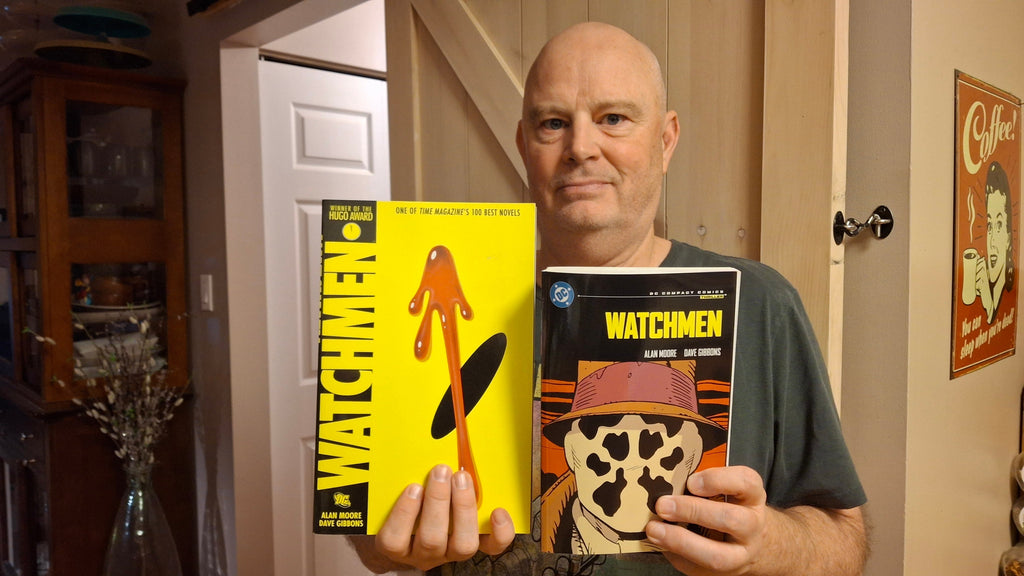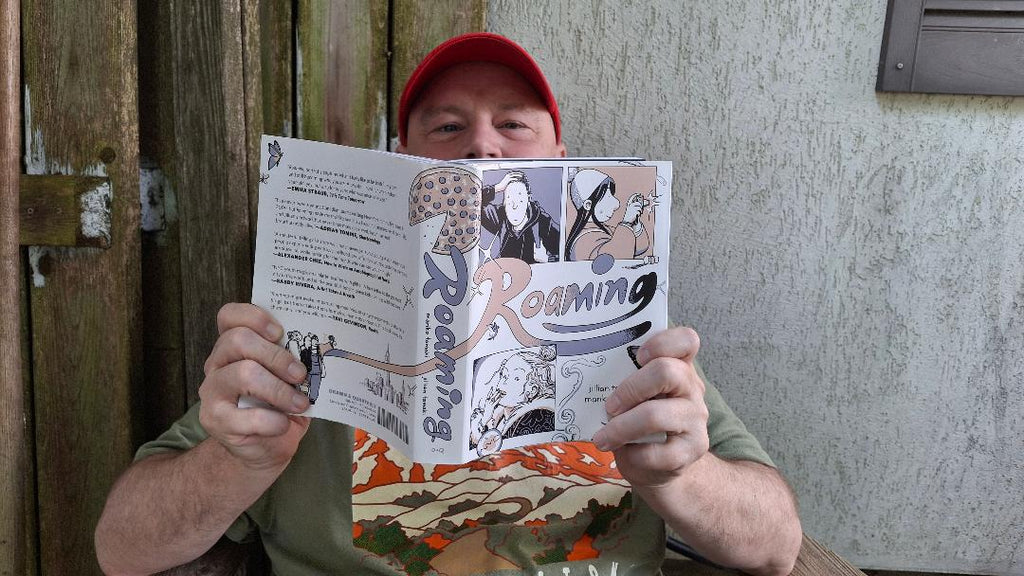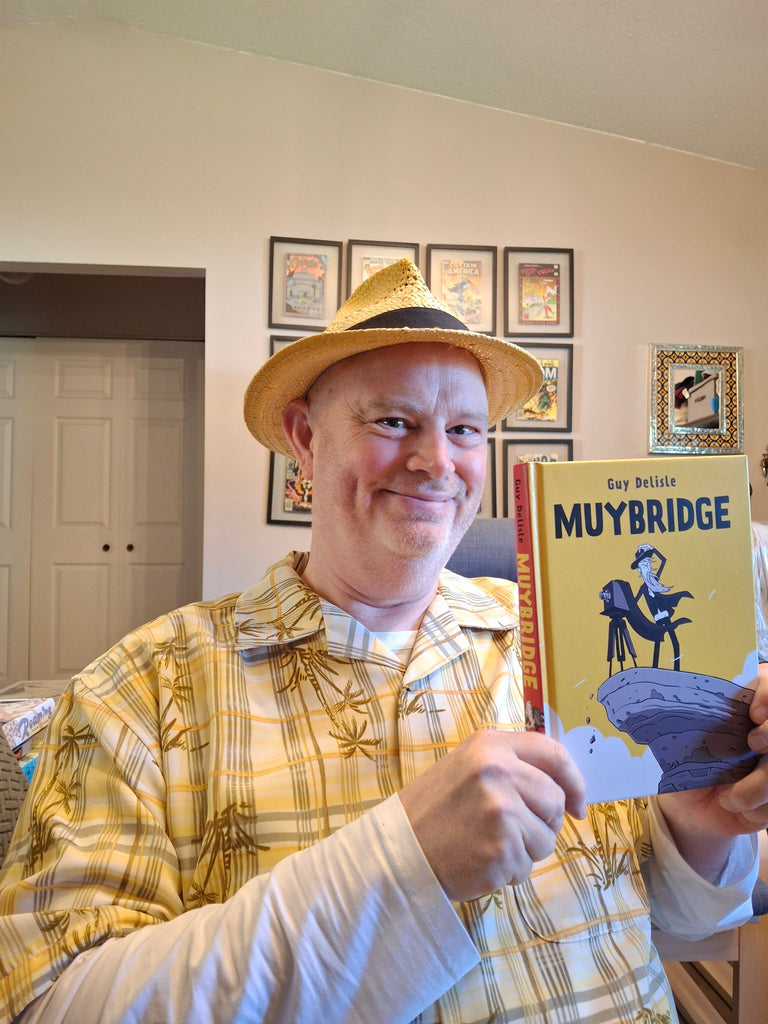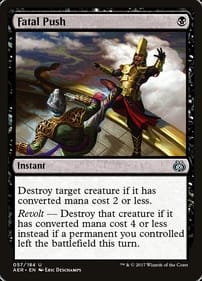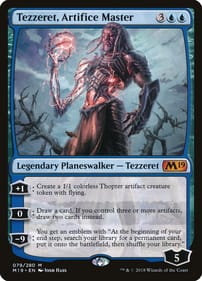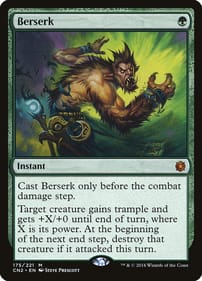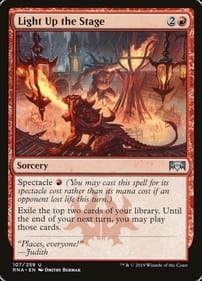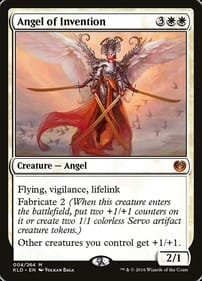GNG Tackles Gun Street Girl
By Dan Brown SPOILER WARNING: This column contains plot details, so if you value surprise, stop reading here! The L.A. Mood Graphic-Novel Group met Saturday, February 14 and this is what happened in our hour-long meeting. The book: Gun Street Girl, written by Barb Lien-Cooper, and illustrated by Ryan Howe. Published by London’s Lucha Comics. The discussion: In our lightning round – every group member gets two minutes to give their overall impressions of the book at the start of each session – it was clear most of us enjoyed Gun Street Girl and found something to appreciate about it. The central characters are Liz, a bodyguard, her boss, Eddie Caution, a paranormal investigator, and Prana, who is Liz’s girlfriend. Eddie hires Liz to be his muscle on paranormal adventures. The action takes place in England, specifically London, so will please Anglophiles (there are several scenes in a pub), and follows the pair as they encounter such monsters as demons, trolls and a baby griffin – so if you’re versed in Dungeons & Dragons or Harry Potter lore, you’ll already have the basic vocabulary down. I guess Gun Street Girl would fall into the urban fantasy genre. What I found fascinating is that despite the title, which is taken from a Tom Waits song, the reader hardly ever sees Liz at work. Her fights mostly take place offstage. In fact, if my memory serves, there’s maybe one panel in the whole collection showing Liz firing her gun. What this means is, the focus is not on violence or gore. I think the heart of the book is the back-and-forth between Liz and Eddie, who is Liz’s guide to the supernatural. It felt to me like a really good workplace sitcom. The very first chapter, for instance, starts in medias res – Liz and Eddie have been captured by a wizard and must figure a way to avoid impending doom. Other stories in Gun Street Girl aren’t about jump scares, but a slow burn of suspense. There’s also a great sense of humour pervading the whole book, which helped me as a reader to accept the premise. It’s a way for the creative team to wink at the audience, allowing readers to suspend their disbelief. So even though the cover (which evokes Alan Davis for me), depicts Liz blasting her way out of a door with tentacles slithering out of it, the thrust of this collection is the relationship between the two leads. What could a lesbian monster assassin and a crusty, over-the-hill mage possibly have in common? One of our other points of discussion was how the dialogue gets better the deeper you get into the book. I figure any creative team takes some time to establish the characters in any given story. I would readily recommend Gun Street Girl. You’ll find it in L.A. Mood on the rack reserved for books and comics with a local connection. A second volume looks to be coming this year, which I can’t wait for. L.A. Mood’s Graphic-Novel Group meets the second Saturday of every month. Next month’s selection is The Goon: Bunch of Old Crap by Eric Powell. I know little about the Goon, so I’m looking forward to learning more about this long-lived Dark Horse Comics title, which goes all the way back to the 1990s. We’re set to meet March 14 at the gaming tables in the store at 11 a.m. All are welcome to join the discussion! Dan Brown has covered pop culture for more than 32 years as a journalist and also moderates L.A. Mood’s monthly graphic-novel group.
Compact Edition Not Quite Watchmen Babies
By Dan Brown When it comes to comics, size matters. But not as much as paper quality. That’s my conclusion after checking out a mini-edition of the classic Alan Moore/Dave Gibbons graphic novel Watchmen. Published under the DC Compact Comics banner, the smaller reprint contains all 12 issues of the 1986 tale about a superhero murder in an alternate America teetering on the edge of nuclear war with Russia. I found the compact edition didn’t suffer for the reduction in size. Powerful scenes, like when Doctor Manhattan zaps Rorschach into oblivion, still pack a powerful punch. I have feeble middle-aged eyes, but I could still read the dialogue without straining. All that said, I still prefer the original edition. The only real advantage the compact version has is its portability. If I was taking Watchmen to read on a beach on a hot summer day, I’d reach for the smaller one. (Of course, if I took Watchmen to the beach, I’d be a deeply weird individual.) How much smaller are we talking? The Compact Comics edition measures 5.5 by 8.5 inches and has a cover price of $13.50. Compare that to the regular size, which measures 6.75 by 10.25 inches, and set me back $22.99 when I picked it up a number of years ago. (Both of them are paperbacks.) If you’re thinking “Don’t odd-size comics have a long history?” you’d be right. Growing up in the 1970s and going to the grocery store with my Mom, I’d see mini-digests of Archie comics at every checkout. I never bought even a single one. I suspect even today, it doesn’t matter much what size Archie comic you buy, the characters and stories likely land the same. But also in the Seventies, if a comic was momentous enough, it would be published in a huge oversize treasury edition (10.5 by 13.5 inches). Those ones were reserved for “event” stories, as when Superman fought Spider-Man in the first DC/Marvel crossover. When Superman squared off against Muhammad Ali in the boxing ring, that story also got the oversize treatment. Naturally, those bigger comics came with a premium price. The one shame about the tiny Watchmen book was the cheaper paper DC used, which diminishes the effect of its colour scheme. Colour artist John Higgins is the unsung hero of Watchmen, and his powerful colouring doesn’t get the props it deserves as an essential part of the Watchmen reading experience. He specifically chose a non-traditional superhero palette, and the story’s impact is lessened with the switch. Doc Manhattan, to name one example, just isn’t as otherworldly when the luminescent blue covering his body is toned down on the duller paper. Watchmen remains one of the best-selling comics of all time. It continues to top sales charts decades after it was published, first as a monthly comic, then a collected graphic novel. So my bottom line is, if a smaller version helps comic stores to move product, then it’s a good thing. If it turns newbies onto Watchmen, or even turns people into fans of the medium in general, then I’m all for it. I’m sure Alan Moore would have something angry to say. Dan Brown has covered pop culture for more than 33 years as a journalist and also moderates L.A. Mood’s monthly graphic-novel group.
I’m the Odd Man Out as GNG Takes on Roaming
By Dan Brown SPOILER WARNING: This column contains details from the graphic novel Roaming, so if you value surprise stop reading right now! Here’s the rundown on the most recent meeting of the L.A. Mood Graphic-Novel Group, which was held Saturday, July 12. The book: Jillian and Mariko Tamaki’s Roaming, which follows three Canadian first-year university students on a five-day trip to New York City. The discussion: In short, I was in the minority as the only GNG member who really enjoyed the book. Odd man out, as usual! GNG has a custom of choosing a Canadian comic for our July meeting, so we honoured that tradition with this selection. (By sheer coincidence, it comes on the heels of two other books by Canadian creators in May and June.) I, along with one other member of the group, pitched Roaming back in January. While I love everything by the Tamakis, other members of the group strongly disliked Roaming, including someone who couldn’t even finish the thing. The thick volume centres on Dani, Fiona, and Zoe, three university students who take a trip to New York for a brief holiday from their studies. It’s very much a story about the problems of young people, which I think is where most of the antipathy comes from. No one at the table said it wasn’t a realistic portrayal of characters in their late teens/early twenties – in fact, the problem seemed to be it was too accurate. Carol Vandenberg, co-owner of L.A. Mood, said Roaming didn’t work for her because it isn’t leavened with humour. The trio of characters see Big Apple sights, go to bars, get coffee, eat pizza, and of course there’s a drama because Fiona is an interloper who threatens Dani and Zoe’s friendship. Spats ensue. Carol made the point that if you’re going to tell a story about young people, a better approach would have been the one John Hughes adopted with the movie Ferris Bueller’s Day Off: Play the foibles of youth for laughs. Gord Mood, L.A. Mood’s other owner, echoed that sentiment, adding the example of another funny coming-of-age comedy, Dazed and Confused. Several elements prevented GNG members from enjoying the travel tale including the ending, which doesn’t wrap anything up. Other members said the art was prosaic, and that a flashback scene – in which we observe Dani and Zoe at a high-school party – wasn’t introduced in a way the reader could understand. Why do I feel differently? Part of my reason for pitching the book was how the character of Fiona is a huge drama queen. Very early in the book, there are signals to readers to treat anything she says with skepticism. The question in my own mind was, “Can we appreciate this book even if one of the leads is an awful person?” After all, if an artist and writer can create a comic with a character who turns you off, isn’t the fact you reacted to a fictional character like you would to a real person a sign the creative team has done a good job? (Would be interested in any opinions on this question in the comment box below.) I also believe there’s something darkly funny about a group of friends whose relationship revolves around avoiding roaming charges on their cellphones. As it turned out, Fiona was just one of the reasons GNG members didn’t enjoy the book, although someone suggested a comic depicting the same characters once they are out of school and taking on careers might make for a better read. Further reading: If you aren’t daunted by now, two other graphic novels by the Tamakis come to mind – Skim (it follows high-school friends) and This One Summer (which features a tween lead). L.A. Mood’s Graphic-Novel Group meets the second Saturday of each month. Next month’s selection is I Am Stan, Tom Scioli’s graphic biography of the one-time Marvel Comics editor-in-chief. You might have heard of Lee before! We will reconvene August 9 at the gaming tables in the store at 11 a.m. You are invited to come join the discussion! Dan Brown has covered pop culture for more than 32 years as a journalist and also moderates L.A. Mood’s monthly graphic-novel group.
Delisle Goes in new Direction with Muybridge
By Dan Brown Muybridge is a funny, thought-provoking portrait of a little-known historical figure that represents an interesting departure for Quebec comic maker Guy Delisle. Delisle, who lives in France, originally made his name with travelogues – like Pyongyang – and his volumes about sloppy parenting. In Factory Summers, he told the story of his teen years. With the exception of 2017’s Hostage, he has not focused on a main character other than himself. Now comes Muybridge, an inventor who was unknown to me before now. Published this spring, the new release is a biography of one of the pioneering minds who helped usher in the age of the photograph, as well as moving pictures – Englishman Eadweard Muybridge. I loved it. I should put my cards on the table: I feel the same way about pretty much all of Delisle’s output. His work has always been strong, in my opinion. And Muybridge – the book, not the man – may also be a bridge to a new kind of storytelling for Delisle. The most interesting bits of the narrative are the parts where Deslisle admits the historical record is incomplete. He does the best he can to recreate Muybridge and his times, but there are moments when he calls attention to the constructed nature of his account. There’s also no question Delisle imbues his central character with some of his own traits. That’s part of the fun. At one point, Delisle says the death of Muybridge’s wife “must have weighed heavily on him,” yet he doesn’t know for sure what he was feeling in that moment. Muybridge was one of the key innovators who helped solve a hotly debated question in the 1800s: Do a horse’s four hooves all leave the ground at the same time when the animal is at full gallop? You and I are used to a media-saturated world in which there are movies about horses, and races like the Kentucky Derby are televised. So keep in mind this was a period when good, old-fashioned painting was only gradually losing its status as the most important representation of reality. The story begins with the advent of early photos such as daguerreotypes. The same guy was also the accused in one of the most sensational murder trials of his day. In Delisle’s telling, he is tenacious and adaptable. Dealt a setback, it’s only a matter of time before he rises again. Along the way, Delisle refuses to play at omniscience in his narrative, reminding the reader multiple times of the gaps in his knowledge. On an early jaunt to France, for instance, Delisle depicts Muybridge peering in the window of a camera studio. Delisle asks, “Is that when he began practicing photography? We don’t know.” (If you’ve ever read Alice Munro's short stories, you’ll have noticed the same kind of narrative uncertainty, so it may be one of the writing quirks that marks Delisle as distinctively Canadian.) Muybridge lived from 1830 to 1904. We may think of those decades as somehow uneventful or idyllic, but it was an age of rapid change. It saw the invention of mass-market photography, recorded music, the paint tube, motion pictures, naughty photos, the phonograph (if the book has a villain, it’s Thomas Edison, who doesn’t come off well), impressionism, colour photography, and animation. I also enjoyed the parts in which Delisle uses comic panels to represent individual frames of a moving picture – he even gives a nod to the film The Matrix as one source of inspiration, driving the point home that Muybridge’s contributions were foundational. As I said, I wasn’t aware of Muybridge until I picked up the book. I recommend it. The truth is, I don’t believe there’s a person or topic Guy Delisle couldn’t make interesting. If you haven’t read his stuff, check him out. This comic creator is a national treasure. Dan Brown has covered pop culture for more than 32 years as a journalist and also moderates L.A. Mood’s monthly graphic-novel group.
Boyd’s New Graphic Memoir is so Groovy
By Dan Brown. If you’re a child of the 1970s, you’re going to love D. Boyd’s Denniveniquity. This new graphic memoir covers the years 1977 to 1980 in the comic creator’s life growing up in Saint John. Boyd, now a Montrealer, captures the Me Decade better than any other artist, on par with filmmaker Richard Linklater – the guy who directed Dazed and Confused. The book begins when button-nosed Dawn is in Grade 7. She has a crush on movie star Gene Wilder and has seen Star Wars three times. Her favourite band is Trooper. Boys like to grab her developing breasts – “WONKA WONKA!!” one yells as he assaults her in the school hallway. Her mother is relentlessly negative. “You’re too young to look so matronly,” she chides. “Boys are only going to want one thing from you.” The book follows Dawn as she navigates each new grade. There are moments of glee, as when classmate Robbie Allen calls her on the phone at home. And moments of frustration: “Isn’t there anything I’m good at?” she wonders after failing to master downhill skiing. Denniveniquity rewards close reading. Each panel is carefully crafted to reinforce the feel of the era in which Dawn grows up. If, like me, the first full decade you lived through was the 1970s, this book is going to be a thrill. Boyd packs each panel with detail. There’s an April Wine T-shirt. A scene at a Trooper concert (there’s also a discussion of the proper way to pronounce lead singer Ra McGuire’s first name). Keen-eyed readers will also spot a reference to Meco’s galactic funk on the back of a newspaper page. Farrah Fawcett-Majors gets a mention, as do TV shows like Soap and Grizzly Adams, and the Hamilton band Teenage Head. It was the decade of faux wood panelling on station wagons, Participaction, KMart, Joe Clark, Jimmy Carter, the Amityville Horror, and Fotonovels. In one explosive splash panel, as the New Year’s countdown approaches and 1980 beckons, Dawn sees the pop culture of her childhood flash before her eyes. “Wow, the ’70s are over,” she marvels. “That was most of my childhood.” And, of course, Dawn gets drunk for the first time by invading her parents’ liquor cabinet in the basement bar. Nor can her young mind understand the unwritten rules of friendship and dating. “Whatever I like about him seems to be the same thing I hate about him,” she says of her on-again, off-again boyfriend Nick. But more than getting the specifics of the 1970s in Canada right, Denniveniquity nails the sensation of how time passes for a young person. Boyd pulls this off by omitting clunky transitions, just as the developing brain does. She glides effortlessly from one scene to the next, and the reader never feels something is missing. It all makes sense. The only other comic creator who was able to do the same as masterfully is Gilbert Hernandez with his childhood recollections in Marble Season. Denniveniquity covers some of the same ground as Boyd’s 2019 book Chicken Rising, but don’t let that deter you. It is also published by the East Coast’s Conundrum Press. I give it my highest recommendation. This book belongs in the same conversation as Jillian and Mariko Tamaki’s This One Summer, Michel Rabagliati’s Paul Moves Out, and Seth’s ongoing Nothing Lasts in Palookaville. With Jeff Lemire’s new autobiography looming in July, this is shaping up to be a landmark year for graphic memoirs by Canadian comic creators! Dan Brown has covered pop culture for more than 32 years as a journalist and also moderates L.A. Mood’s monthly graphic-novel group.
GNG Meets to Talk About Toronto Coming-of-age Memoir
By Dan Brown SPOILER WARNING: This column contains plot details from Maurice Vellekoop’s I’m So Glad We Had This Time Together, so if you value surprise, stop reading now! Here’s the rundown on the most recent meeting of the L.A. Mood Graphic-Novel Group, which took place Saturday, May 10. The book: I’m So Glad We Had This Time Together by Toronto graphic artist Maurice Vellekoop. The discussion: The book we all read falls squarely into the Canadian school of graphic memoirs – for some reason, homegrown creators are really good at telling their own origin stories. In fact, they are the best in the world. In this particular case, Vellekoop puts the focus on his own upbringing as the son of religious Dutch immigrants who settled in Toronto. L.A. Mood Comics & Games co-owner Carol Vandenberg pitched the book in January for our 2025 reading list as she, too, is the child of a Dutch immigrant family. Carol said she recognized a bit of her experience in the book’s details, like Vellekoop’s mother making clothes for her children and his childhood home being decorated with Rembrandt and Vermeer paintings. It was the Walt Disney movie Fantasia that sparked Vellekoop’s imagination as a child. He attended a screening with his father, who is a central figure in the artist’s story. One moment his dad is spanking him, the next spoiling him. Talk about mixed messages! During our opening lightning round – everyone around the table gets two minutes to share their initial thoughts – almost every group member said they enjoyed or appreciated the book. We did talk about the graphic nature of the story – there are a number of sex scenes as Vellekoop embarks on his voyage of self-discovery. We briefly discussed how much of a creator’s personal life the reader ought to see, with some members noting how Vellekoop wanted to be transparent about his identity. One central paradox runs through the whole story: According to their religious beliefs, his parents indicate it’s fine for Vellekoop to be gay, but he can’t get into heaven if he ever acts on his sexuality. Naturally, this contradiction messes him up. Later in life, Vellekoop goes into therapy. After a number of tries, he finds a therapist who helps him make sense of his feelings about his mother and father. Vellekoop is more than up to the challenge of making the process of therapy – therapist and client sitting and talking – visually interesting for the reader. In the hands of a lesser artist, those sections of the book might not have been as compelling. One of the devices he uses is what I would call “the devil and angel on his shoulders.” Vellekoop gives the two conflicting voices in his head a physical form as clouds of emotion, and finally – at the moment of his biggest breakthrough in therapy – they dive back into his head. Another element group members mentioned liking is the memoir’s depiction of Toronto over the years. In one party scene in the 1980s, for instance, I spotted one of my former Ryerson journalism profs – Vellekoop did not skimp on any details. He got the look and feel of different eras in Toronto history right. Further reading: Check out Seth’s It’s A Good Life If You Don’t Weaken, Michel Rabagliati’s Paul Moves Out, and Jeff Lemire’s next book, which will be released on July 15, is called 10,000 Ink Stains: A Memoir. L.A. Mood’s Graphic-Novel Group meets the second Saturday of every month. Next month’s selection is Dean Motter’s Mister X: The Modern Age. We are on a roll with Canadian books in recent months! We’ll reconvene June 14 at the gaming tables in the store at 11 a.m. All are welcome to join the discussion! Dan Brown has covered pop culture for more than 32 years as a journalist and also moderates L.A. Mood’s monthly graphic-novel group.



